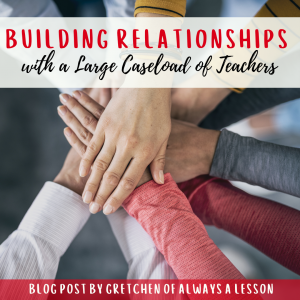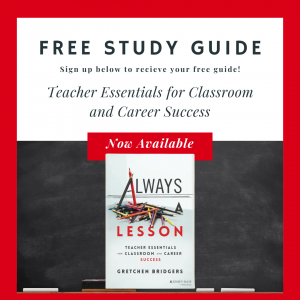Building Relationships with a Large Caseload of Teachers
Building relationships with teachers can be challenging for instructional coaches, especially when you are supporting a large caseload of teachers. Regardless of difficulty, it can be done. And its advantageous to figure out just how to do it too.
This post will outline ways instructional coaches can build relationships with a large group of teachers.
Why Should Coaches Build Relationships with Teachers?
 Before a productive partnership between coach and teacher can be established, a relationship must exist. Trust and respect lay the foundation for the partnership to grow. If coaches and teachers haven’t built a relationship then trust and respect aren’t even available to use as motivation for wanting to work together. Plus, both a coach and a teacher are humans. When they connect as people first before colleagues, they establish commonalities to relate to, which starts the bonding process. Each exchange is an opportunity to strengthen the bond, demonstrate respect for the knowledge and expertise of each individual in the partnership as well as trust that they each will hold up their end of the bargain – the teacher will implemented suggested next steps and that the coach will always have the best interest of the teacher in mind when designing supports.
Before a productive partnership between coach and teacher can be established, a relationship must exist. Trust and respect lay the foundation for the partnership to grow. If coaches and teachers haven’t built a relationship then trust and respect aren’t even available to use as motivation for wanting to work together. Plus, both a coach and a teacher are humans. When they connect as people first before colleagues, they establish commonalities to relate to, which starts the bonding process. Each exchange is an opportunity to strengthen the bond, demonstrate respect for the knowledge and expertise of each individual in the partnership as well as trust that they each will hold up their end of the bargain – the teacher will implemented suggested next steps and that the coach will always have the best interest of the teacher in mind when designing supports.
How Can Coaches Build Relationships with Teachers?
Building relationships takes time. It is not something that can be rushed or saved for a “Get to Know You” activity. It is a conscious effort made by each person in the partnership to grow their connection so that they can better work together.
Below are ways coaches can build relationships with teachers:
- Meet-and-Greet: Set up a quick introduction meeting where teachers can see you face-to-face, learn a bit about your interests, and get excited for working together. Keep it brief, genuine and personable.
- Examples: Whenever possible, share details from your own life or teaching experience that allow teachers to relate to you due to similar experiences
- Ask Questions: Most people do not just come out with details about themselves. But by being curious in conversation, coaches can learn details about teachers that will help them better navigate the partnership (ie. personality, teaching style, favorites, fears, etc.)
- Be Consistent & Ongoing: Trust forms out of consistency. When teachers see that their coach continues to check in on them, deliver what they promised, show up on time, etc. trust is built. When coaches do these same things consistently over time, now their investment in the relationship increases. The coach has proven they are worthy of the time and attention of the teacher to do the hard work of growing their skillset.
For more ideas, listen to this podcast on building relationships with teachers.
How Can Coaches Build Relationships with a Large Caseload of Teachers?
The challenge occurs when taking the relationship building strategies of a smaller group and applying them to a larger group. When supporting a large caseload of teachers, the time you can physically spend with each teacher is shorter. This means coaches have to be even more intentional to establish personal connections with each teacher on their caseload.
Below are ways coaches can build relationships with a large group of teachers they support:
- Think Outside the Box– Be creative with how you show up and support the large group. The techniques of meeting 1:1 will not suffice. There is not enough time during the day to meet with each teacher, especially if they are at different campuses. Collaborate with other coaches in your same position and even ask teachers for ideas for how to best support them when you aren’t in the same building as they are some days.
- Utilize Technology– Leverage technology to communicate and be available when you are not physically in the same place at the same time. Tools like Voxer and Marco Polo allow coaches to host virtual office hours for Q/A to meet the needs of teachers in the moment. (Read this post and this post to learn more about Voxer). You do not need to be physically together to engage in a coaching session. Lots of collaborations can occur during commute time. With it being the 21st century, coaches can be available without being in the same place as the same time as their teachers.
- Split the Group into Cohorts– Coaches can leverage the expertise of the other teachers on their caseload to help each other. By grouping teachers based on area of need, coaches can address the cohort as a whole on the similar need. This allows the coach to widen their message and support when it is similar in nature for a bunch of teachers.
- Design the Ideal Calendar– Allow all teachers no matter the campus they teach on to have access to your calendar. When they know how to reach you and when you will be physically available to help them, they will continue to communicate and want to work together. If coaches inconsistently show up, teachers cannot prepare for working together and begin to feel overwhelmed. Set up a schedule so that each teacher has the same amount of time. This may mean each building does not have you on campus for the same length of time. For example, if one building has 8 teachers you support and another building only has 1 teacher, then the amount of time you spend on both of those campuses would be different. You need more time on the campus with more teachers. Make adjustments to this calendar as you execute the schedule.
These suggestions allow touch points with teachers by overcoming the obstacle of being in the same place at the same time. Relationships need to be built on a daily basis, so creating ways to reach teachers daily (regardless of where each teacher is) allows the partnership to thrive.
No matter what building relationships strategy you employ, just remember teachers want to connect with humans. Remain humble, relatable and genuine. Ask questions, show empathy, and encourage improvement. Relationships can be built in large groups!
If you are need of resources to help you become an even stronger coach, browse these printable and digital options. Check out my instructional coaching must-haves here.
GO BE GREAT!

Which is your favorite way to support a large caseload of teachers?

 Get Edu-Tips, Freebies and grab your FREE Study Guide for Gretchen’s New Book!
Get Edu-Tips, Freebies and grab your FREE Study Guide for Gretchen’s New Book!